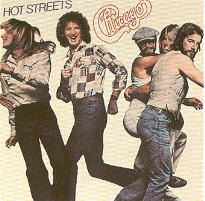 HOT STREETS HOT STREETS
Release Date: 1978
Cover Design: Band members running
Proves Cover Theory?: Not sure
Becky Rating: V out of X
POST-TRAUMATIC STRESS DISORDER
Hot Streets (a name! not a number!) is a decent pop album. It's not a great pop album, and it's not really a ROCK album, but it is an enjoyable piece of '70s pop. Considering the circumstances under which it was written and recorded, it's amazing that Chicago could come up with something this listenable.
Hot Streets is the first album Chicago released following the break with longtime producer James William Guercio and the accidental shooting death of guitarist Terry Kath. The band hired a new young guitarist, former Stephen Stills collaborator Donnie Dacus; worked with producer Phil Ramone (most famous for his work with Billy Joel) at Miami's Criteria Studios; decided to give the album a title rather than a number; and for the first time featured the band members prominently on the album cover. The album's release in the fall of 1978 was accompanied by an enormous media blitz that included a People Magazine cover story and extensive coverage in Rolling Stone. The album went platinum and several of its songs hit the Top Forty. Chicago was back...or was it?
Musically, Hot Streets is notable for being one of Chicago's most riff-heavy albums, probably to give Dacus something to do. Fuzz bass and loud guitar riffs are everywhere, particularly in Ain't It Time, Alive Again, and Little Miss Lovin'.
Here I have to confess something - Little Miss Lovin' is my favorite Chicago guilty pleasure song. Sure, the lyrics are stupid and sexist, and Peter Cetera over-does it on the vocals, but when that bass kicks in - wow! The presence of the Bee Gees, who were recording their Spirits Having Flown album at Criteria at the same time, on background vocals dates the song a little, and reminds us how all-pervasive the singing Manxmen were in 1978-79. I wonder what Peter thinks of this song now that he has daughters of his own?
On the other hand, there are several interchangeable ballads on Hot Streets, the most popular of which was No Tell Lover. This is one of Chicago's most beautiful music tracks (listen to that transition back to the verse after the horn break), but to enjoy the song you have to ignore Cetera's wimpy lead vocal and pseudo-Italian inflection. How did Danny Seraphine and his, uh, friends let him get away with that? The song has become a classic on light-rock radio.
Robert Lamm seems a little lost and confused - he probably was in shock at the time, as he and Kath were very close friends - but does contribute a nice jazz-inflected tune in the title cut. His Love Was New, on the second side, suffers from percussion-itis. Even though one can never have too much Latin percussion, sometimes it's misplaced in Chicago, and here it is.
Lyrically, the themes of loss and renewal show up in several songs. Both Alive Again and Gone Long Gone could be about relationships, or about coping with Kath's death. Ain't It Time also offers "time for moving on, time enough to grow." And doesn't Gone Long Gone sound like a lost Rutles track? Lee Loughnane co-writes a cute "gambling as a metaphor for love" song in Take a Chance. The rest of the album's lyrics are banal - but yours probably would be too if you had just gone through all the traumatic events Chicago did at the time.
With Hot Streets, we have a strong, but flawed, album that both reflected the events of the past year and looked to the future. If only Chicago hadn't dropped the ball.
(c) 2001 Becky Banfield for Dos Gardenias Productions
Back to Chicago Album Review Index
Back to Chicago Homepage
Back to Music
Happy Cause I'm Going Home
|